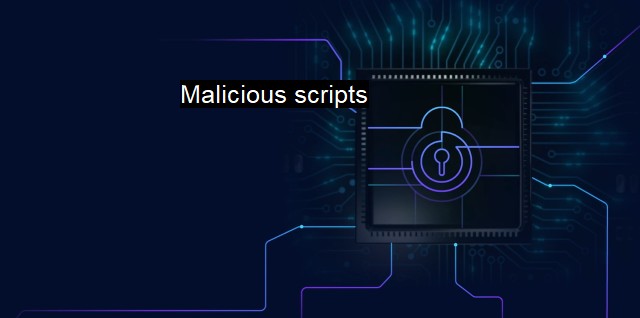What are Malicious scripts?
Understanding Malicious Scripts: Types, Strategies and Risks in Cybersecurity
Understanding the concept of "malicious scripts" is crucial. Malicious scripts refer to a set of instructions programmed by hackers to automatically execute unauthorized and harmful activities on victim devices or networks. These activities include sabotage, data theft, unauthorized control over a system, or further propagation to other connected devices. The context, tools, operating systems, browsers, or languages used to write and execute these scripts can vary significantly.Generally, these scripts are coded using languages such as JavaScript, HTML, VBScript, PHP, or Python. They can be embedded in web pages or in standalone files and often trick recipients into executing them through social engineering techniques such as phishing. For instance, a malicious script might masquerade as a software update or email attachment, tricking the user into initiating it themselves. Unfortunately, the consequences of such actions can be highly damaging for the victims.
Malicious scripts can be responsible for various nefarious operations. Some malicious scripts may run processes that contribute to a distributed denial of service (DDoS) attack, whereby a website's servers are overloaded by traffic and consequently brought down. Likewise, others may execute functions to set up backdoors on a victim’s system, allowing cybercriminals to infiltrate and gain control of the machine. these scripts also might be responsible for data breaches by initiating illegal data transfers or managing a keylogger that records and steals user keystroke inputs, thereby compromising sensitive information.
Since malicious scripts are compact and can typically be baked into seemingly innocuous files or pages, they usually go undetected by traditional antivirus scanners, making them particularly dangerous to users and networks alike. They can rapidly infect numerous systems, spread malware, or corrupt files before being recognized and stopped.
Malicious scripts are not invincible. There is a multitude of antivirus solutions available that are capable of tackling them effectively. These solutions often employ techniques like behavior-based detection, heuristic analysis, and sandboxing to detect, scrutinize, and neutralize such threats. Updated antivirus software detects unusual patterns of behavior such as a sudden surge in network traffic or memory use, which are typically indicative of a malicious script action.
In the case of heuristic-based detection, antivirus software analyzes the code in files to look for characteristics that are typical of malware. This way, even if the malicious script has never been encountered before, it can still be detected based on its features which resemble known malware. Another approach, sandboxing, involves isolating potentially malicious files in a controlled environment in order to analyze their behavior without any risk to the actual system.
While comprehensive antivirus protection plays a major role in combating malicious scripts, users must also understand and follow safe internet practices as an added measure. Staying cautious and not interacting with suspicious links or attachments, especially those received from unfamiliar sources, is critical. Keeping operating systems and applications updated with the latest patches and moving away from unsupported software also helps to limit vulnerabilities that can be exploited by malicious scripts.
Thus, while malicious scripts continue to evolve and pose formidable challenges their effects can be mitigated by the combination of improved antivirus technology and increased user awareness. It is everyone’s shared responsibility to prioritize cyber health by engaging in safe online practices while also relying on advanced antivirus systems to scan for and eliminate the threats posed by malicious scripts.

Malicious scripts FAQs
What are malicious scripts?
Malicious scripts are small pieces of code that are written with malicious intent. These scripts are used to exploit vulnerabilities of a system and gain unauthorized access to sensitive information.How do malicious scripts work?
Malicious scripts work by exploiting vulnerabilities in a system's security. Once the script gains access, it can perform various malicious actions, such as stealing sensitive data or infecting other devices within the network.How can I protect my system from malicious scripts?
To protect your system from malicious scripts, you should always keep your antivirus software up-to-date and install the latest security patches. Additionally, you should avoid opening suspicious emails or downloading files from untrusted sources.What should I do if I suspect my system has been infected by a malicious script?
If you suspect your system has been infected by a malicious script, you should immediately disconnect from the internet and run a full system scan with your antivirus software. You may also want to seek professional cybersecurity assistance to further investigate and remediate the issue.| | A | | | B | | | C | | | D | | | E | | | F | | | G | | | H | | | I | | | J | | | K | | | L | | | M | |
| | N | | | O | | | P | | | Q | | | R | | | S | | | T | | | U | | | V | | | W | | | X | | | Y | | | Z | |
| | 1 | | | 2 | | | 3 | | | 4 | | | 7 | | | 8 | | |||||||